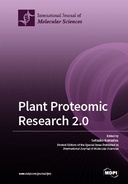Explore

Advancements in high-throughput “Omics” techniques have revolutionized plant molecular biology research. Proteomics offers one of the best options for the functional analysis of translated regions of the genome, generating a wealth of detailed information regarding the intrinsic mechanisms of plant stress responses. Various proteomic approaches are being exploited extensively for elucidating master regulator proteins which play key roles in stress perception and signaling, and these approaches largely involve gel-based and gel-free techniques, including both label-based and label-free protein quantification. Furthermore, post-translational modifications, subcellular localization, and protein–protein interactions provide deeper insight into protein molecular function. Their diverse applications contribute to the revelation of new insights into plant molecular responses to various biotic and abiotic stressors.
This book is included in DOAB.
Why read this book? Have your say.
You must be logged in to comment.
Rights Information
Are you the author or publisher of this work? If so, you can claim it as yours by registering as an Unglue.it rights holder.Downloads
This work has been downloaded 360 times via unglue.it ebook links.
- 144 - pdf (CC BY-NC-ND) at Unglue.it.
- 173 - pdf (CC BY-NC-ND) at res.mdpi.com.
Keywords
- (phospho)-proteomics
- 14-3-3
- 14-3-3 proteins
- 2-DE
- 2-DE proteomics
- 2D
- 2D DIGE
- ? subunit
- ?-subunit
- affinity chromatography
- after-ripening
- ammonium
- antioxidant activity
- Arabidopsis thaliana
- B. acuminata petals
- barley
- bolting
- Cadmium
- Camellia sinensis
- carbon metabolism
- caspase-like
- chlorophyll deficiency
- chlorophylls
- chloroplast
- chlorotic mutation
- Clematis terniflora DC.
- Co-infection
- cold stress
- cultivar
- data-independent acquisition
- degradome
- differential proteins
- differentially abundant proteins (DAPs)
- Dn1-1
- drought stress
- early and late disease stages
- elevated CO2
- ergosterol
- flavonoid
- fungal perception
- GC-TOF-MS
- gel-free/label-free proteomics
- gene ontology
- Germination
- Glycolysis
- GS3
- heat stress
- heterotrimeric G protein
- high temperature
- holm oak
- imbibition
- innate immunity
- isobaric tags for relative and absolute quantitation (iTRAQ)
- ISR
- iTRAQ
- late blight disease
- LC-MS-based proteomics
- leaf
- leaf cell wall proteome
- leaf spot
- lesion mimic mutant
- lettuce
- Maize
- MALDI-TOF/TOF
- mass spectrometric analysis
- mass spectrometry analysis
- Medicago sativa
- metacaspase
- Morus
- N utilization efficiency
- n/a
- nitrate
- nitrogen metabolism
- non-orthodox seed
- nucleotide pyrophosphatase/phosphodiesterase
- organ
- Oryza sativa L.
- papain-like cysteine protease (PLCP)
- patatin
- pathway analysis
- Pattern Recognition Receptors
- pea (Pisum sativum L.)
- petal
- Phalaenopsis
- phenylpropanoid biosynthesis
- phosphoproteome
- Photosynthesis
- physiological responses
- Phytophthora infestans
- plant pathogenesis responses
- plant-derived smoke
- plasma membrane
- Pollination
- polyphenol oxidase
- population variability
- potato proteomics
- protease
- protein phosphatase
- Protein phosphorylation
- proteome
- proteome functional annotation
- proteome map
- proteome profiling
- Proteomics
- Pseudomonas syringae
- Puccinia recondita
- pyruvate biosynthesis
- qRT-PCR
- Quantitative Proteomics
- Quercus ilex
- RGG3
- RGG4
- Rice
- rice isogenic line
- Ricinus communis L.
- root
- ROS
- RT-qPCR
- Sarpo Mira
- secondary metabolism
- seed dormancy
- seed imbibition
- seed proteomics
- seed storage proteins
- Seeds
- senescence
- shoot
- shotgun proteomics
- silver nanoparticles
- Simmondsia chinensis
- smut
- SnRK1
- Solanum tuberosum
- somatic embryogenesis
- Sporisorium scitamineum
- SPV2 and SPVG
- Stagonospora nodorum
- starch
- stresses responses
- subtilase
- sucrose
- sugarcane
- sweet potato plants infected by SPFMV
- sweet potato plants non-infected by SPFMV
- targeted two-dimensional electrophoresis
- transcriptome profiling
- tuber phosphoproteome
- vegetative storage proteins
- virus induced gene silencing
- weakening of carbon metabolism
- western blotting
- wheat
- wheat leaf rust
- Zea mays
- Zea mays L.
Links
DOI: 10.3390/books978-3-03921-063-3Editions


